Sao Paulo Forum Throws Support Behind Chavez as Venezuela Drifts into Zone of Heightened Risk
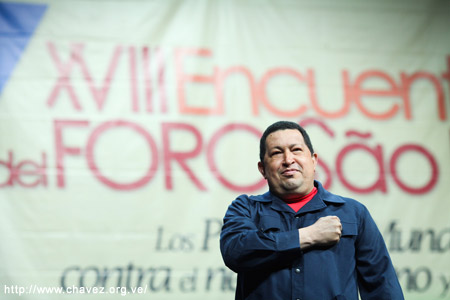
Naturally, the scope of the debates in Sao Paulo was not limited to the Venezuelan presidential race. The global economic nosedive and the West's increasing reliance on force in international relations were among the themes discussed, along with prospects for deeper regional integration, proposals for fresh socioeconomic initiatives, and various aspects of the left parties' electoral tactics.
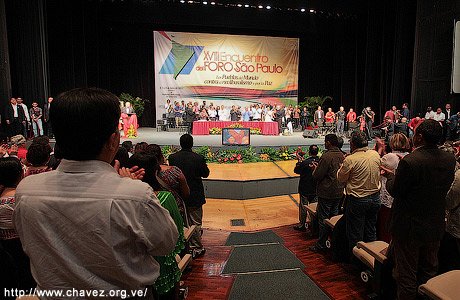
The 14 seminars organized in the framework of the forum dealt with such issues as efforts to counter the global imperialism,, to remove the blockade which continues to strangulate Cuba, and to decolonize Puerto Rico and the Falkland Islands. Participants looked into the root causes of the rise of drug cartels across the Western Hemisphere and convincingly unmasked the drug lords' allies in the US financial circles and intelligence community. Serious concerns were voiced in the process that the emboldened US was trying to coerce Latin America into rebuilding the situation which persisted on the continent before the Cuban revolution. Currently Latin America is being targeted both by propaganda and militarily, with at least 40 US military bases already deployed in the region.
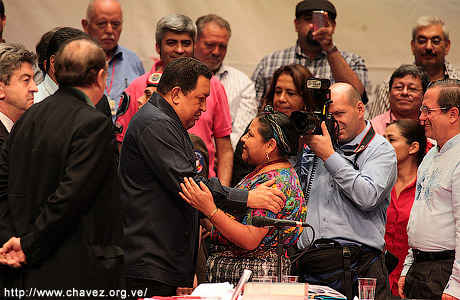
The declaration passed by the 18th Sao Paulo forum largely sounded as a tribute to H. Chavez's peaceful Bolivarian revolution. It stated that the Latin American nations are in the process of transition from the dark night of neoliberalism to an epoch of unprecedented social justice. Over a decade ago, the continent started to regain genuine independence and sovereignty for its nations. Latin America put an end to foreign exploitation of its natural riches, the creeping deindustrialization, the erosion of national labor codes, the spread of unemployment, ruthless welfare cuts, and the resulting living standards decline. In the past epoch, people in Latin America saw their essential rights – to health care, education, and housing - neglected in the course of neoliberal reforms under the pretexts of free market and globalization. Venezuelans were the first to shake off passivity and rebel, with the rest of Latin America largely following suit.
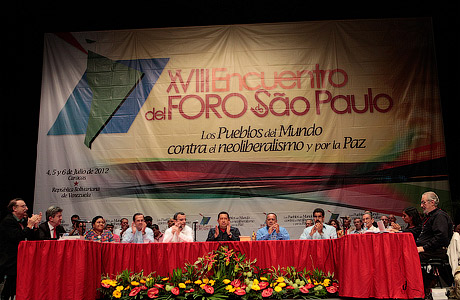
H. Chavez addressed the forum on the closing day. He called the participants to bravely transform the world so as to make justice and prosperity available to everyone and stressed that the bourgeois hegemony in various spheres of life must be overturned. Chavez further said that the forum's activists represented revolution and their foes – stagnation, and explained that his objective was not to perpetuate personal rule but to redistribute authority in the interests of the majority, to empower the people. Preventing the capitalist hegemony is a realistic agenda, said Chavez, as the conditions are taking shape across the world that would make it possible for a whole concert of nations to switch to socialist reforms. Chavez praised the forum for accomplishing a lot over the couple of decades of its existence, and stressed that a watershed moment was coming, with socialism retaking grounds after a protracted retreat and its proponents finally winning. He held that Latin America's progressive governments actually led the struggle for the ideals of socialism and humanism, and at the moment frequently meet with understanding even in the countries where prejudice against the continent's populism used to prevail. These days, protests multiply among the young in France, Greece, in Chicago, and even in Israel. Chavez urged full solidarity with the protesters who are confronted with hostile media and the hardships of recession.
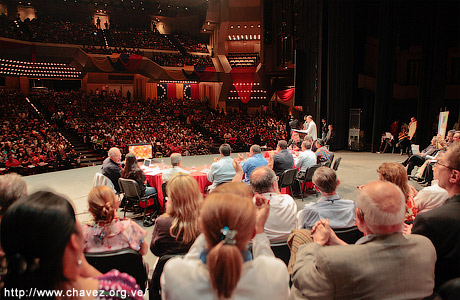
Speaking to the forum audience, Chavez called for vigorous practical steps and for an informal approach to daily work, and focused on the importance of Latin American integration, but asked whether the listeners were prepared to maintain a common organization upon returning home and to stick to an agenda scientifically validated in the Marxist sense. Lula da Silva once warned Chavez in Manaos that integration would never become possible unless an irreversible defeat is inflicted upon bureaucracies. Implicatively, Chavez delivered a message that the forum's declarations should be more practically oriented and less eclectic from the standpoint of theory.
Chavez certainly has a point regarding the above. The forum's declaration says nothing about student protests against the privatization of universities and the abolition of free tuition in Chile, Mexico, Columbia, the Dominican Republic, and other countries. Neoliberal governments brush off the legitimate demands posed by the young people and appear to believe that a slide towards Pinochet-style policies is their best solution. The declaration similarly ignores the fact that US military bases in Latin America mushroom and already fully surround Venezuela and Brazil, the two countries seen by the Empire as its regional opponents. The Pentagon obviously plants the bases as a preparation for the future world war to spread its force over a greater number of locations. That, however, would not spare the US return strikes, and the regimes cooperating with the Pentagon actually expose their populations to lethal risks.
Coverage of the Sao Paolo forum in the Western media combined the two usual modes: it was either completely ignored or smeared. On July 12 Saúl Godoy Gómez published under the title Foro de Sao Paulo: Los zombis toman Caracasa a viciously distorted account of the event at an internet outlet of UnaAmerica, an NGO set up by the CIA in Caracas with the specific aim of opposing the forum. The following excerpt fully exemplifies Gómez's perceptions: “The so-called forum is a central organization of all of the continent's murderous leftist forces who promise humanistic changes and peace but, in reality, do their best to reinforce the tyrannies of leaders like Hugo Chavez. The sick individual with a modest smile is likened to Jesus Christ, while the zombies - in the guise of democrats, representatives of their nations, and speakers for the disadvantaged - preach about a better world for the coming generations and prepare to rise in support for their candidate. The living dead profess underdevelopment and defend poverty, and their movements reek of opportunism and fascism. They need to have Chavez at the helm in Venezuela simply because the participants of the Sao Paulo forum depend on the country's leadership for funding. We therefore end up sponsoring the monumental convention of foreigners seeking to destroy democracy, to clamp down on human rights, to unleash wars, to kidnap and kill innocent people, to organize blasts, and to traffic drugs...”. Communists, go home, demands Gómez in conclusion.
No doubt, getting rid of Chavez tops the list of Washington's priorities for Latin America. The Empire explores every option with the objective in mind, even ridiculously mimicking the "Yankee go home" slogan. The ultra-right in and outside of Venezuela a priori intend to call into question the outcome of the elections in the country regardless of how convincingly Chavez outruns his rivals. In response, Chavez's supporters get organized domestically and internationally to safeguard the legitimate results of the poll. They are fully aware what is at stake and know that their unity is crucial under the circumstances, and, importantly, the forum adopted a serious program of protecting the electoral process in Venezuela. In particular, July 24 will be celebrated as the day of global solidarity with Venezuela's Bolivarian revolution and defiant leader Hugo Chavez. An international event to which leaders of political groups and trade unions, renown authors, and artists – many of them from the Western world – are invited will be held in Caracas in the first half of September to uphold the cause. Early in October, thousands of visitors, including the Sao Paolo forum's guests, will flock to Caracas to take part in a range of pertinent active solidarity activities.
In August, the Internet and the print media will feature a letter of solidarity with Venezuela. The document will be open for signing by all people of good will, and, hopefully, millions of people in Russia will seize the opportunity to voice support for H. Chavez and his peaceful Bolivarian revolution!